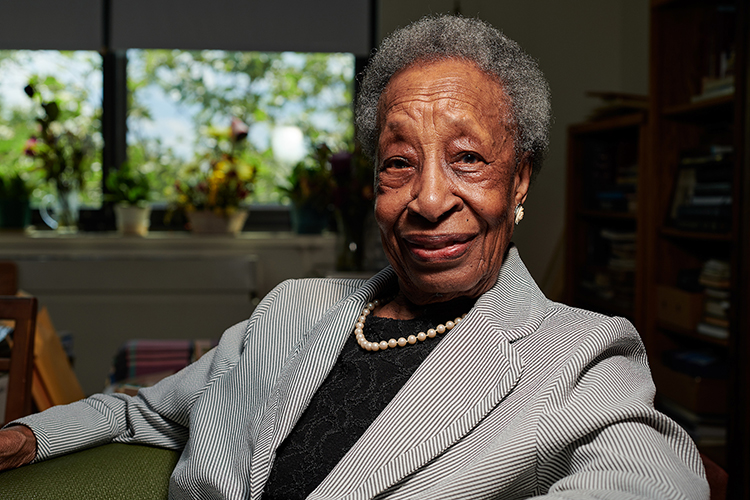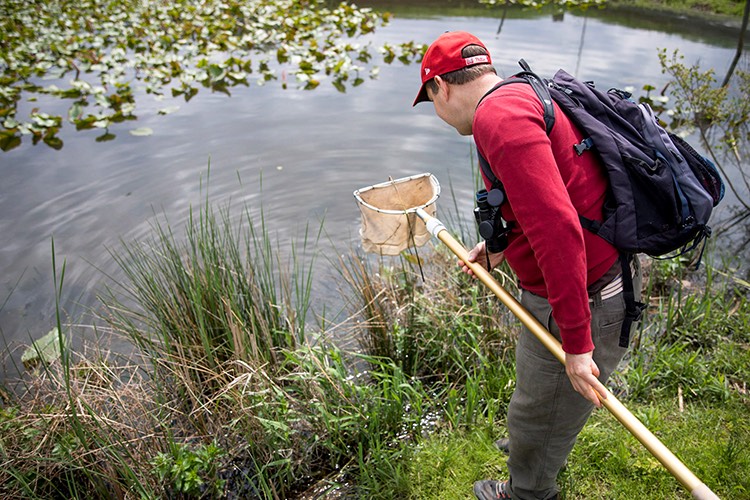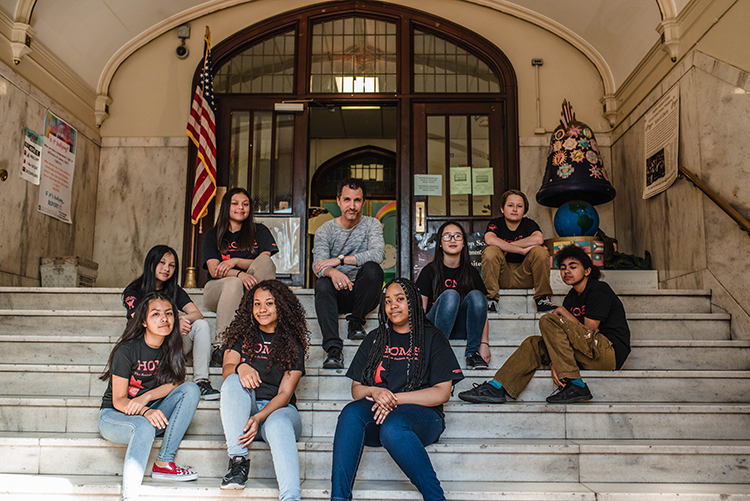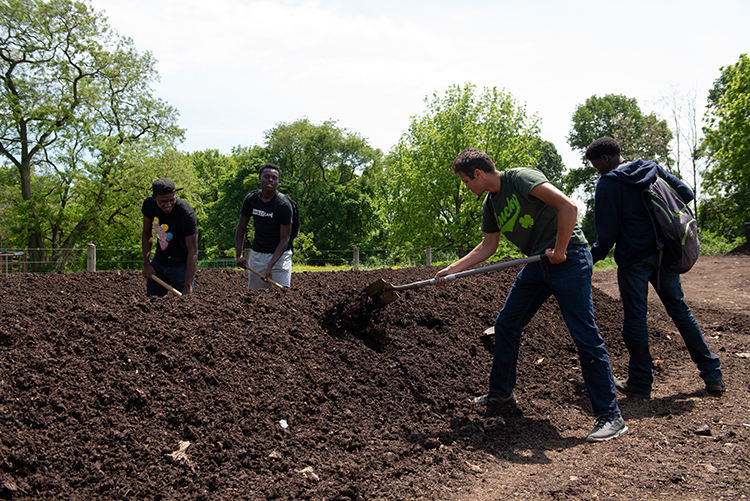Photo by Albert Yee
By Constance Garcia-Barrio
Black women centenarians have seen Philadelphia go from oil lamps to LEDs. Their recollections paint a spoken portrait of the faith that has leavened their lives, and of their bedrock work of homemaking, guiding children, nursing the sick and other tasks essential for a thriving city.
“I worked in the laundry room at Hahnemann Hospital on the sewing machine,” says Lillian Warren, 100, of North Philadelphia. “Whenever a uniform needed repairs or hemming, I did it.
“My life was normal, nothing special,” Warren continues. Married at 15, she worked at Hahnemann until her three sons were born. After raising them, she became a nurse’s aide and, later, a child helper at Green Tree School.
“Whatever I could do for the children, I did,” she says.
One memory still rankles. “There was a situation where a girl’s father was molesting her, but I couldn’t prove it,” Warren says.
After a century, faith and service still stand foremost for Mother Warren, as she’s known at St. Andrews Fellowship Baptist Church in Germantown, which she attends regularly. She also finds ways to help
her neighbors.
“If they need a zipper put in or something mended or hemmed, they come to me. I’m glad to do it,” she says.
Ruth Hopson, 106, seems poised to start a new career: Not as a stand-up comedian, but a recliner comic.
“Didn’t you bring any men with you?” she asks when I enter the elegant apartment near City Line Avenue where she lives with her seventy-something daughters.
Born in South Philly in 1912, the year the Titanic sank, Hopson, her parents, five siblings, and her Aunt Fanny and Uncle Sam—the latter blinded in the Civil War—lived at 422 Quince Street.
“It didn’t have a bathroom but an outhouse, like many houses then,” Hopson says. “Everyone had a horse and wagon—trash collectors, icemen, firemen. A dog used to ride on the horse-drawn fire wagons. He’d jump on the wagon before anyone else.”
Without the danger of cars, the Hopson siblings played volleyball and jumped rope in the street. “I was athletic,” she says.
Hopson recalled a favorite family outing. “My father would take us to Camden on the ferry. When the Benjamin Franklin Bridge opened [in 1926], my parents decided we would cross [over to New Jersey] that way. My brothers and sisters started to run onto the bridge, but I was afraid. I stood and cried until my family coaxed me to come on.”
Hopson had hoped to become a teacher, but her mother, widowed early, had herself and six children to support. Money was a barrier, and so was race.
“Black women had fewer opportunities in those days,” Hopson says. She graduated from high school, then did domestic work until her marriage in 1942. Homemaking and caring for her four daughters and her husband, who died in 2008 at age 95, gave her joy. Hopson lived her dream of a career in another way. Three of her daughters became teachers.
Hopson’s faith continues to sustain her. Clergymen from St. Thomas African Methodist Episcopal Church pray with her and give her communion at the apartment once a month since a fall last year keeps her close to home. Her mementos include a congratulatory letter from President Barack Obama, sent for her 100th birthday.
And Hopson had advice for young people: “Don’t be poor! Get a job.”
Encouraged by the jokes and winks that spice her conversation, I promise to take Hopson to a naughty destination next time I visit. She looks askance. “You won’t take me,” she says. “I’ll take you!”
Dorothy Davenport Alexander, 100, came to Philadelphia in 1935. By then, she’d already raised a ruckus in Charlotte, North Carolina, her hometown.
“I was 10 or 12 years old when I got on the bus that came through the black neighborhood,” she says. “All the white people were sitting and all the black people were standing. I saw one empty seat and sat down. The blacks looked frightened and the whites looked angry. One of the whites said I was uppity. Later, one of the black folks told my mother about the incident. She didn’t scold me, but she said, ‘Dorothy, don’t ever do that again!’ That was long before Rosa Parks.”
When Alexander’s mother died in 1935, she and her older brother came to live with relatives in North Philadelphia.
“I attended Gratz High School, but I didn’t graduate,” she says. “It was the
Depression, and my family was struggling financially, so I left school and started doing domestic work.”
She encountered prejudice and discrimination in Philadelphia, too.
“I said to myself, ‘So be it, I’ll find a way around it,’ ” she recalls.
Alexander sewed military uniforms. “I was a hand-finisher. We had to make a high quota, and time was of the essence,” she says.
Meanwhile, she prepared herself for other work. She purchased a book on how to succeed on city, state and federal exams, and began taking vocational courses. Thanks to her studies, Alexander became a nursing assistant at the Veterans Administration Hospital. She also worked as an optical technician at the Frankford Arsenal.
Of the positions she held over the years, Alexander considers that of caregiver for the Reverend C.S. Griffin, a paraplegic evangelist, her most important one.
“He drove a car with hand controls,” she says, “and I accompanied him when he travelled to help him spread his message of God’s love.”
After Reverend Griffin’s death in 1985, Alexander found solace and comfort in doing volunteer work.
“I volunteered in the hospice program at Einstein Hospital, and later as a companion for other seniors at the Philadelphia Corporation for Aging,” she says.
Today, Alexander continues to give of herself through singing.
“I attend Zion Baptist Church on Broad Street,” she says. “I’ve sung in choirs all my life—even when I was in Charlotte—and I was asked to be a member of Zion’s comfort choir [which sings at funerals],” says Alexander, a longtime member of the National Association of Negro Musicians. “I’ve always loved singing. I sing myself to sleep at night.”
Alexander, who married twice but had no children, offered this advice about life: “The secret for keeping good health is gratitude and love,” she says. “The whole purpose of life is to experience love.”







